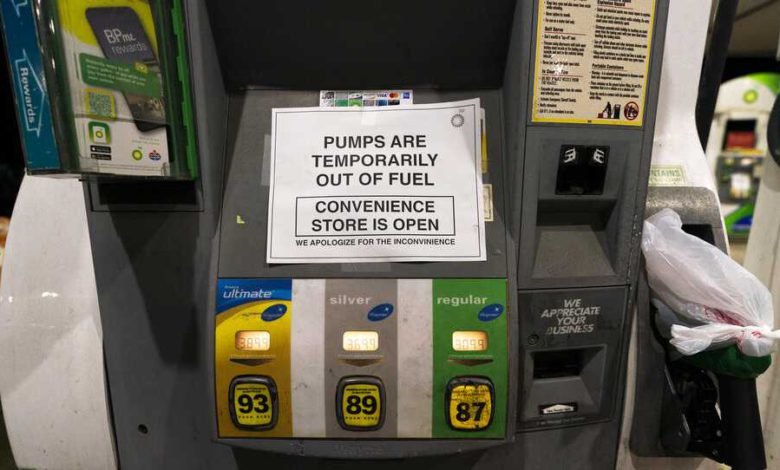
But the good news is that I can tell you as of right now, the retail stations, the gas station outages are down about 12 from the peak and the average improvement is about 200 stations are coming online per hour over the past six hours, so it's still going to work its way through the system over the next few days. But we should be back to normal fairly soon. People should not panic really. The gasoline is coming and this hoarding issue, if you take more than what you need, it becomes a self fulfilling prophecy. In terms of the shortages. As you can imagine, The president signed an executive order on cybersecurity a couple of days ago on the federal government side and we also have been working department of energy as well as other agencies. We started about 50 days ago, 100 day sprint to make sure that we are doing all we can to protect our critical infrastructure. This though, the pipeline infrastructure is private. A lot of these, a lot of these things that we all use are owned by private entities. And so we really want to send a message to the private sector to other government agencies that everybody has to be on high alert and install the most, the latest and best cyber security devices.
Colonial Pipeline says 'normal operations' have resumed after cyberattack
The operator of the nation's largest gasoline pipeline — hit earlier this week by a ransomware attack — announced Saturday that it has resumed "normal operations," delivering fuel to its markets, including a large swath of the East Coast.Georgia-based Colonial Pipeline had begun the process of restarting the pipeline's operations on Wednesday evening, warning it could take several days for the supply chain to return to normal. "Since that time, we have returned the system to normal operations, delivering millions of gallons per hour to the markets we serve," Colonial Pipeline said in a tweet Saturday. Those markets include Texas, Louisiana, Mississippi, Alabama, Tennessee, Georgia, South and North Carolina, Virginia, Maryland, Washington D.C., Delaware, Pennsylvania and New Jersey."All of these markets are now receiving product from our pipeline," the company said, noting how its employees across the pipeline "worked safely and tirelessly around the clock to get our lines up and running."Gas shortages, which spread from the South, all but emptying stations in Washington, D.C., have been improving since a peak on Thursday night. Energy Secretary Jennifer Granholm told The Associated Press on Friday that the nation is "over the hump" on gas shortages, with about 200 stations returning to service every hour."It's still going to work its way through the system over the next few days, but we should be back to normal fairly soon," she said. Some stations were still out of gas in Raleigh, North Carolina, on Saturday. Driver Jermaine Barnes told CBS17 the shortage has made him more conservative with his trips."I'm not going places I don't need to go," he said. "I'm not visiting people. I'm watching where I'm driving. I'm doing everything different right now."Martha Meade, manager for public and government relations at AAA Mid-Atlantic, said many gas stations in the Virginia area still did not have gas on Saturday. But she said "lines have diminished from the height of the crisis" and "panic buying has subsided."Multiple sources confirmed to The Associated Press that Colonial Pipeline had paid the criminals who committed the cyberattack a ransom of nearly $5 million in cryptocurrency for the software decryption key required to unscramble their data network.The ransom — 75 Bitcoin — was paid last Saturday, a day after the criminals locked up Colonial's corporate network, according to Tom Robinson, co-founder of the cryptocurrency-tracking firm Elliptic. Prior to Robinson's blog post, two people briefed on the case had confirmed the payment amount to AP. The pipeline system delivers about 45% of the gasoline consumed on the East Coast.
The operator of the nation's largest gasoline pipeline — hit earlier this week by a ransomware attack — announced Saturday that it has resumed "normal operations," delivering fuel to its markets, including a large swath of the East Coast.
Georgia-based Colonial Pipeline had begun the process of restarting the pipeline's operations on Wednesday evening, warning it could take several days for the supply chain to return to normal.
"Since that time, we have returned the system to normal operations, delivering millions of gallons per hour to the markets we serve," Colonial Pipeline said in a tweet Saturday. Those markets include Texas, Louisiana, Mississippi, Alabama, Tennessee, Georgia, South and North Carolina, Virginia, Maryland, Washington D.C., Delaware, Pennsylvania and New Jersey.
"All of these markets are now receiving product from our pipeline," the company said, noting how its employees across the pipeline "worked safely and tirelessly around the clock to get our lines up and running."
Gas shortages, which spread from the South, all but emptying stations in Washington, D.C., have been improving since a peak on Thursday night. Energy Secretary Jennifer Granholm told The Associated Press on Friday that the nation is "over the hump" on gas shortages, with about 200 stations returning to service every hour.
"It's still going to work its way through the system over the next few days, but we should be back to normal fairly soon," she said.
Some stations were still out of gas in Raleigh, North Carolina, on Saturday. Driver Jermaine Barnes told CBS17 the shortage has made him more conservative with his trips.
"I'm not going places I don't need to go," he said. "I'm not visiting people. I'm watching where I'm driving. I'm doing everything different right now."
Martha Meade, manager for public and government relations at AAA Mid-Atlantic, said many gas stations in the Virginia area still did not have gas on Saturday. But she said "lines have diminished from the height of the crisis" and "panic buying has subsided."
Multiple sources confirmed to The Associated Press that Colonial Pipeline had paid the criminals who committed the cyberattack a ransom of nearly $5 million in cryptocurrency for the software decryption key required to unscramble their data network.
The ransom — 75 Bitcoin — was paid last Saturday, a day after the criminals locked up Colonial's corporate network, according to Tom Robinson, co-founder of the cryptocurrency-tracking firm Elliptic. Prior to Robinson's blog post, two people briefed on the case had confirmed the payment amount to AP.
The pipeline system delivers about 45% of the gasoline consumed on the East Coast.
Source link










